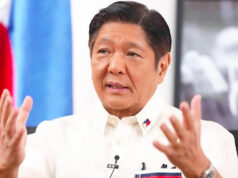Duterte signs EO setting up inter-agency cluster, guidelines for normalization process in Bangsamoro region
THE EXECUTIVE Order (EO) setting up an inter-cabinet cluster mechanism for the “timely” implementation of the normalization program in the new Bangsamoro region has been signed by President Rodrigo R. Duterte.
The normalization program is contained as an annex under the Comprehensive Agreement on the Bangsamoro (CAB) signed by the Philippine government and the Moro Islamic Liberation Front (MILF) in 2014 following peace negotiations.
EO No. 79, signed by Mr. Duterte on April 24, creates the Inter-Cabinet Cluster Mechanism on Normalization (ICCMN) “to ensure timely, appropriate and efficient delivery of the normalization program.”
“I guess ‘timely’ would mean within the timeframe of the GPH (government of the Philippines) and MILF or at least within the remaining term of PRRD (Duterte),” Bangsamoro Transition Authority (BTA) member Omar Yasser C. Sema said in a phone message.
The normalization program covers the following: Security, which includes the decommissioning of MILF’s combatants and their transition to civilian life as well as the disbandment of private armed groups; socio-economic development for the Bangsamoro Autonomous Region in Muslim Mindanao; and transitional justice mechanisms to address legitimate grievances and move towards healing the wounds of conflict.
The normalization program, according to the EO, “provides for a process to ensure human security in the Bangsamoro and enable the communities to achieve their desired quality of life through the pursuit of sustainable livelihood and political participation within a peaceful and deliberative society.”
The ICCMN will be composed of representatives from the Office of the Presidential Adviser on the Peace Process and the Office of the Cabinet Secretary.
The members will consist of representatives from the National Security Council, Departments of Interior and Local Government, Defense, Justice, Social Welfare and Development, Agriculture, Education, Health, Labor and Employment, Finance, Budget and Management, Trade and Industry, and Information and Communications Technology; the National Economic and Development Authority; Commission on Higher Education; Technical Education and Skills Development Authority; and National Commission on Indigenous Peoples.
“The Chairpersons shall convene meetings regularly and as often as may be necessary to ensure proper coordination and implementation of this Order,” the President’s order reads.
As for the specific powers and functions of the ICCMN, it is expected to “coordinate and mobilize relevant government agencies in implementing the various aspects of the normalization program; provide policy advice, further support and other necessary input or assistance to the appropriate modality and mechanism for the timely and smooth implementation of the different components of the program; supervise and monitor all socio-economic interventions under the program; create a working group on vulnerable sectors to be composed of relevant government agencies; submit periodic reports on the implementation of this Order; and perform such other functions as may be directed by the President. — Arjay L. Balinbin



